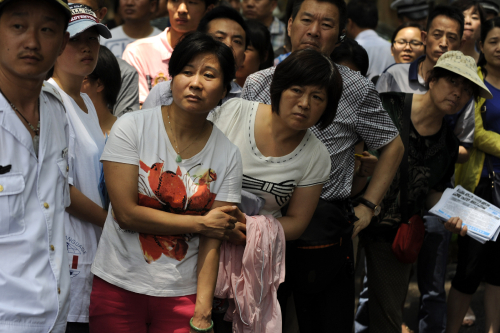|
 |
|
HOW DID YOU DO?: Parents wait for their children outside a gaokao testing center at Weimin High School in Zhengzhou, central China's Henan Province, on June 7, 2014 (LI BO) |
Promoting fairness
During a news conference on September 4 last year in Beijing, Vice Education Minister Du Yubo said the ongoing reform on the gaokao system is aimed at promoting fairness and supervision and connecting all levels and types of education.
"Education reform is a complex project involving all levels of society. It's reasonable for the Central Government to have educational fairness, the top concern of the public, as its first priority," said Yang Dongping, a professor at Beijing Institute of Technology.
In a move to promote fairness in the gaokao, the MOE announced in its reforming measures on December 16 last year that math, science and sport competition winners will no longer receive extra points on their college application. The move looks to respond to social concerns as bonus points can be easily manipulated through bribes, the ministry said.
For years, China has adopted a policy of awarding extra credit to college applicants who win major sports events, math or science competitions, which has prompted a boom in math and science training centers. Bonus points are also common for students from Taiwan, ethnic minorities and returned overseas Chinese.
The "extra points" policy was designed to make up for the weakness of the traditional gaokao, which solely focused on students' academic performance while ignoring non-academic skills. It was designed to encourage rounded development of students.
However, due to lack of supervision, the policy has led to corrupt admission procedures in many places, generating public dissatisfaction. It is believed that terminating the policy will clean admission procedures.
In a high-profile college admission scandal in the summer of 2014, 87 out of around 1,000 gaokao participants of a high school in Benxi, northeast China's Liaoning Province, were initially awarded extra points since they possessed athletic certificates. This was only two less than the total number of students with extra points for sporting talent in the combined school for five other cities in Liaoning, aroused suspicion. Later the provincial education authorities ordered reexaminations. They found 66 of the school's 87 students voluntarily gave up the test and their privileges were canceled.
However, with the policy of discarding extra bonus, there emerged a concern that students and parents may lose passion on developing non-academic skills due to the policy change. But Ye Zhiming, Vice President of Shanghai University, believed one of the new measures has pointed to a solution.
The measure said schools should build profiles for students, which include not only their academic scores, but also evaluation on their special talents, moral condition as well as physical and mental health.
"Hopefully, the profiles recording students' overall quality can replace the 'extra points' system," Ye said.
In another move to promote fairness, the MOE said it will continue its efforts to narrow the gap in college enrollment in different regions to ensure nationwide equality in higher education.
Vice Education Minister Du said that by 2017, the gap between provinces and regions with the lowest college enrollment rate and the national average should be no more than 4 percentage points.
Narrowing the regional gap in college enrollment and ensuring that students from across the country have equal access to higher education is one of the focuses of the reform. Du said the government has been taking measures to narrow the gap.
By implementing a preferential enrollment policy that requires colleges to recruit more students from central and western regions, 200,000 students from these regions have been recruited since 2008, Du said.
He also said that in 2013, the lowest college enrollment rate among all provinces and regions in China was 70 percent, or 6 percentage points lower than the national average, while the gap in 2007 was 17 percentage points.
Rural students have gained greater access to good universities, with the implementation of a policy to improve their chances of being admitted by such universities. The policy, which took effect in 2012, covers 832 impoverished counties nationwide.
"In 2014, 50,000 rural students were admitted to good universities, marking an 11.4 percent increase from 2013," Du said.
To achieve the goal set for 2017, Du said, the ministry will continue implementing preferential-enrollment policies, while fully considering regional differences when drawing up each year's recruitment plan. The ministry will also consider many other factors, including the number of students, education resources and the graduates' employment prospects.
Email us at: yinpumin@bjreview.com | 